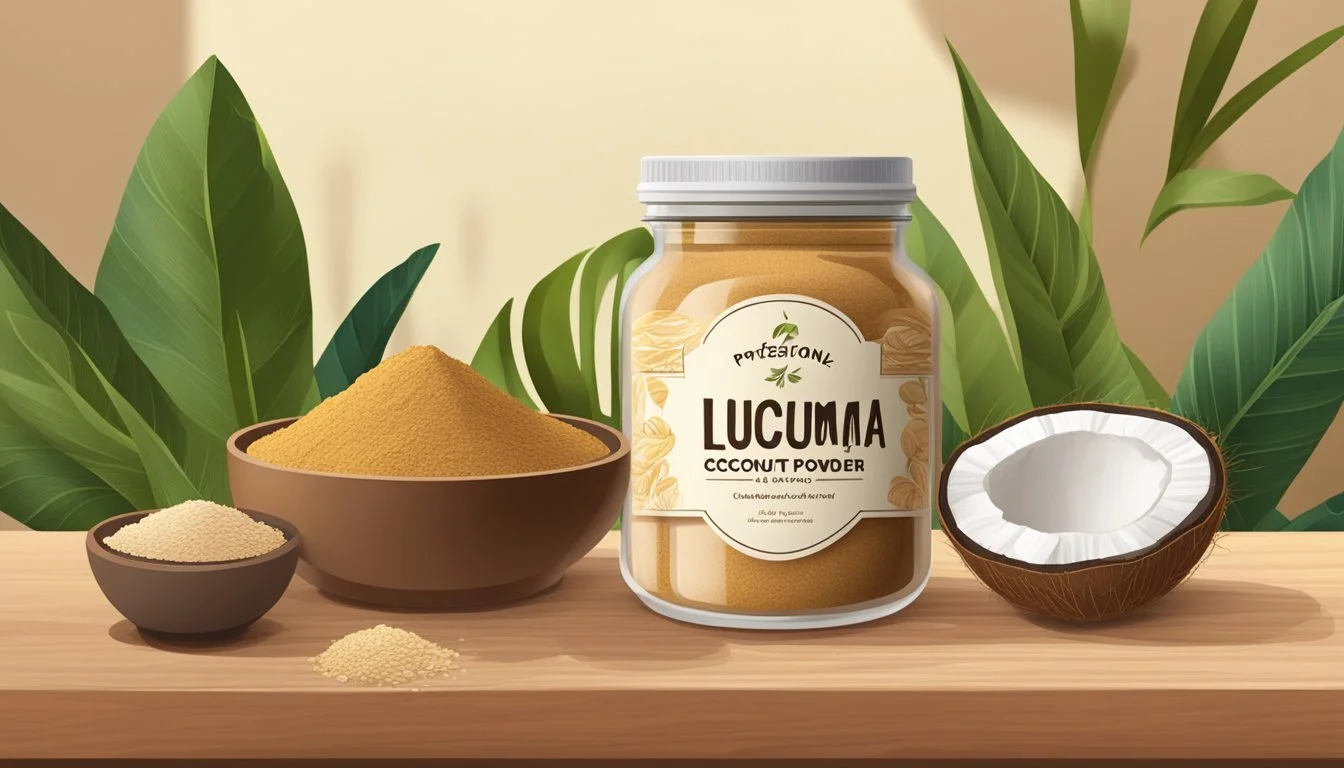Lucuma Powder Substitutes
Top Alternatives for Your Recipes
When lucuma powder isn't available or just doesn't fit your needs, there are several viable substitutes that can step in to sweeten your dishes. For a 1:1 substitute, coconut sugar is an excellent choice. It matches the fine, powdery texture of lucuma powder and offers a similar caramel-like sweetness.
Another good alternative for those seeking the nutritional benefits of lucuma is maca powder. It carries a nutty flavor and offers substantial fiber and vitamins, enhancing both taste and health. Malta powder can also be used in some recipes, especially when aiming to maintain a similar texture and sweetness.
For those who prioritize low glycemic index options, monk fruit sweetener might be an excellent pick. Unlike traditional sugar, it doesn't spike blood sugar levels and provides a subtle sweetness that's less intrusive than standard sweeteners. Exploring these substitutes can ensure you retain both the flavor and benefits of lucuma powder in your culinary endeavors.
Understanding Lucuma
Lucuma is a highly nutritious and versatile fruit native to South America, particularly known for its favorable impact on health. It has a rich history, an impressive nutritional profile, and various health benefits, making it a valuable addition to any diet.
Origins and History
Lucuma (Pouteria lucuma) is a subtropical fruit that thrives in the Andean valleys of Peru, Chile, and Ecuador.
Known as the "Gold of the Incas," lucuma has been a staple food for centuries among indigenous peoples. It grows at altitudes between 1,000 and 2,400 meters and reaches heights of up to 20 meters.
The fruit itself has a green, shiny exterior with a vibrant orange-yellow flesh. It has been traditionally used not only for its taste but also for its nutritional value.
Nutritional Profile
Lucuma is dense with essential nutrients. It provides a significant amount of fiber, vitamins, and minerals, making it a powerhouse of nutrition.
Vitamins: Rich in B vitamins, especially B3 (niacin). Contains vitamin A in the form of beta-carotene.
Minerals: Supplies calcium, magnesium, and potassium.
Antioxidants: Packed with antioxidants that help in reducing oxidative stress.
Macronutrients: Contains carbohydrate, protein, and a small amount of fat. Also, it includes beneficial trace minerals.
With its low glycemic index, lucuma is an excellent alternative sweetener suitable for those managing blood sugar levels, like individuals with diabetes.
Health Benefits
Lucuma contributes to various health benefits due to its nutrient composition. Its antioxidants help combat aging and lower the risk of chronic diseases.
Immune System: The fruit’s rich antioxidant content can boost immune function.
Heart Health: The fiber, along with potassium and magnesium, plays a role in maintaining healthy blood pressure and reducing the risk of heart disease.
Diabetes: Its low glycemic index makes it suitable for regulating blood sugar levels.
Weight Management: High fiber content can help in managing weight by promoting feelings of fullness.
Lucuma is also believed to have potential anti-cancer properties due to its antioxidants and might help protect against obesity.
Lucuma in Culinary Uses
Lucuma powder, with its caramel-like sweetness, has a wide range of applications in both traditional and contemporary cuisine. Its natural sweetness and versatility make it a popular choice in various dishes, from baked goods to smoothies.
Traditional Recipes and Dishes
In traditional culinary settings, lucuma has long been a favored ingredient in South America. It is often used in desserts, such as cakes, puddings, and ice creams, providing a unique, naturally sweet flavor reminiscent of sweet potato and maple.
These traditional recipes typically incorporate lucuma into the batter or mixture, enhancing both texture and flavor.
Lucuma is also used in homemade yogurts, where its subtle sweetness complements the tang of the fermented milk. Additionally, it can be mixed into oatmeal for a nutritious and flavorful breakfast option.
Its versatility allows it to blend seamlessly with both dairy and non-dairy bases, making it a staple in various cultural cuisines.
Contemporary Uses in Cuisine
In modern kitchens, lucuma powder is celebrated for its potential as a sugar alternative. It is used extensively in baking to sweeten cakes, cookies, and other desserts without significantly impacting blood sugar levels. Its caramel-like taste pairs well with chocolate, making it a common addition to chocolate-based recipes.
Lucuma is also popular in beverages, including smoothies, coffee, and other drinks, adding a touch of natural sweetness without the need for refined sugars.
In addition, it can be sprinkled on top of yogurt and mixed into oatmeal, providing an extra layer of flavor and nutrition. For those seeking a healthy twist, lucuma can be used in raw desserts like energy balls and protein bars, where it helps bind ingredients and imparts its distinctive taste.
Popular Lucuma Substitutes
Lucuma powder offers a unique, sweet maple-like taste, but there are several other natural alternatives that can readily replace it. These substitutes include maple syrup, raw honey, and coconut sugar, each bringing their unique flavors and benefits.
Maple Syrup
Maple syrup is a natural sweetener made from the sap of maple trees. Its rich, maple-flavored profile makes it a versatile substitute for lucuma powder in various recipes. It’s particularly effective for baking and adding to beverages.
Benefits include its antioxidant properties and a lower glycemic index compared to refined sugar. This makes it a healthier choice for those monitoring their blood sugar levels. Additionally, it's packed with essential nutrients like manganese and riboflavin, enhancing its nutritional value.
Raw Honey
Raw honey serves as a natural and effective sweetener with health benefits. It's famous for its antioxidants and trace amounts of vitamins and minerals. Its distinct flavor can add richness to recipes that call for lucuma powder.
Raw honey's antimicrobial and anti-inflammatory properties make it beneficial beyond its sweetening capabilities. When using raw honey, remember it’s sweeter than lucuma powder, so you might need to adjust the quantity accordingly.
Coconut Sugar
Coconut sugar is derived from the sap of coconut palm trees and offers a sweet, caramel-like flavor. It's an excellent alternative to lucuma powder, particularly in baking and desserts.
A significant benefit of coconut sugar is its lower glycemic index, making it a suitable option for those seeking to manage their blood sugar levels. It also retains some nutrients from the coconut palm, such as iron, zinc, calcium, and potassium, adding extra nutritional value to your dishes.
Artificial and Natural Sweetener Alternatives
When seeking substitutes for lucuma powder, considering artificial and natural sweeteners provides a variety of options. These alternatives often cater to different dietary needs and preferences, such as zero calories options for diabetics or those seeking low-glycemic sweeteners.
Stevia
Stevia is derived from the leaves of the Stevia rebaudiana plant. It is a natural sweetener popular among those seeking sugar substitutes without calories. Stevia is about 200 times sweeter than sugar, making it a potent alternative.
Due to its natural origin, it is commonly used by diabetics and those looking to reduce carbohydrate intake. Stevia comes in various forms, including liquid, powder, and granules, making it versatile for different culinary applications. One advantage is its stability in heat, which allows it to be used in baking and cooking.
Sugar Alcohols and Extracts
Sugar alcohols, such as xylitol and erythritol, are another category of sweeteners. These are often used in sugar-free products because they provide sweetness without the spike in blood sugar levels seen with regular sugar. Xylitol, for example, is derived from plants and has a similar sweetness to sugar but with fewer calories.
Extracts like agave nectar and pyure offer additional alternatives. While agave nectar is high in fructose, it has a low glycemic index, making it suitable for some diabetics when used in moderation. These sugar substitutes are also beneficial for dental health as they do not contribute to tooth decay.
Monk Fruit Sweetener
Monk fruit sweetener is another natural sugar substitute derived from the monk fruit (Siraitia grosvenorii). This sweetener is unique because it contains zero calories and has no effect on blood sugar levels, which makes it ideal for diabetics and those on low-calorie diets. Monk fruit sweetener is about 150-200 times sweeter than sugar, allowing for minimal amounts to be used in recipes.
It is available in various forms, including liquid and powder, making it adaptable for different uses in meals and beverages. While it can be more expensive than other sweeteners, its benefits often justify the cost for those requiring specific dietary restrictions.
Each of these alternatives offers distinct benefits depending on the dietary needs and preferences of the individual, providing versatile options for replacing lucuma powder in sweetening foods and beverages.
Choosing a Lucuma Substitute
When selecting a substitute for lucuma powder, several factors come into play, including flavor profile, nutritional content, and where you can buy the alternatives.
Flavor Considerations
Flavor is key. Lucuma has a unique taste described as a blend of caramel and butterscotch with hints of maple syrup.
For a similar flavor, maple syrup or brown sugar can be good choices. They mimic the sweet, slightly caramelized taste.
Butterscotch flavorings can also work but might lack the subtle nuances found in lucuma powder.
Nutritional Aspects
Nutritional aspects should not be overlooked. Lucuma powder contains calories but is packed with nutrients like fiber, beta-carotene, iron, zinc, vitamin B3, and antioxidants.
Those needing a low-calorie option might consider stevia or monk fruit, though they lack the beneficial nutrients of lucuma.
If the goal is to maintain a low glycemic index, opting for replacements like monk fruit or xylitol can support diabetes management.
Availability and Accessibility
The availability of lucuma substitutes varies. Some common options like brown sugar and maple syrup are readily available in grocery stores and health food stores.
For more specialized substitutes like monk fruit or mesquite powder, you might need to check online sources or specialty health food stores.
Finding the right lucuma substitute depends on understanding these key aspects and how they fit into your specific dietary needs and flavor preferences.





